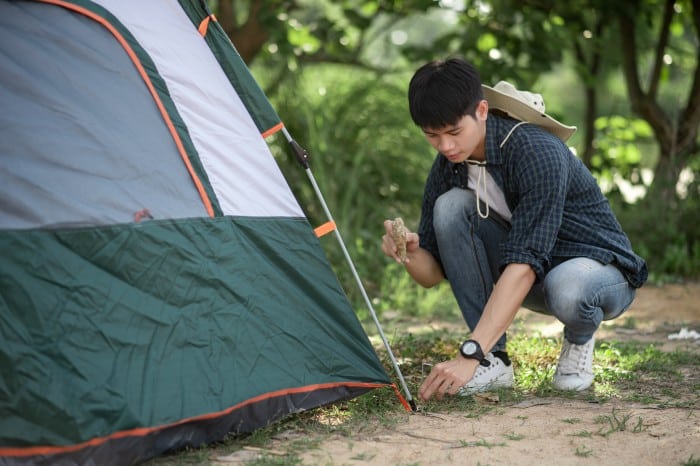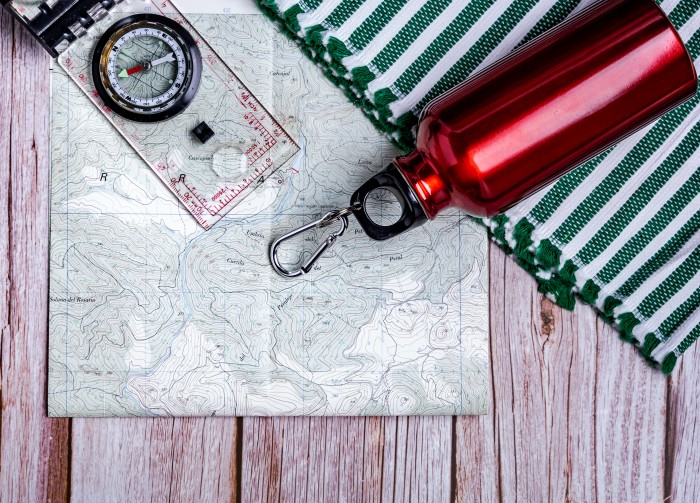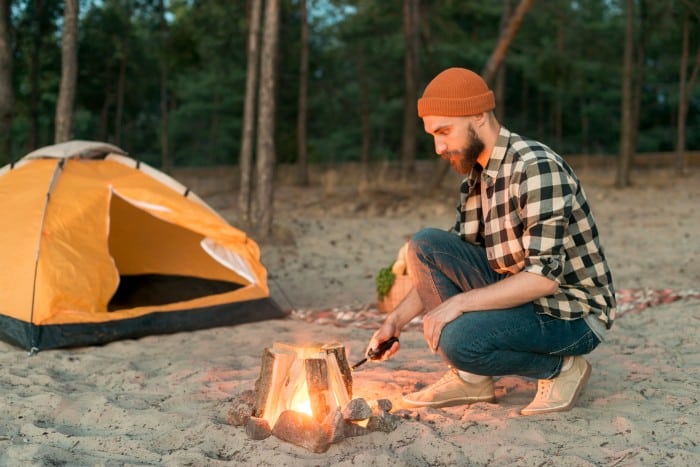The call of the wild is alluring. But camping off-grid is about improvising to whatever situation may come your way. It’s not all about following a rigid set of rules.
When you go camping, expect to do different things like implementing basic survival skills, exploring the wild, and doing some self-reflection. You adapt to uncomfortable situations, breathe in the fresh air, and embrace minimalism. Camping is like dancing; it’s about finding your own rhythm.
Camping makes you pause and observe the world, so you can explore it safely and ethically. It makes you mindful.
Activities You Do On A Camping Trip
A lot has been said about fun activities to do while camping. However, the most important step to having a successful camping trip is self-sufficiency.
Make sure you learn the basic skills and follow protocol for the place you’re camping.
1. Build Shelters
You may not need to build a shelter depending on where you’re camping. This is true for those who camp out in their vehicles. For others, building a safe shelter is a must.
Avid campers are pros at shelter-making. Most people carry their tent for overnight camping, but ad-hoc shelters can be made with tarp and rope depending on the situation.
Campers use many different kinds of shelters based on their requirements.

2. Prep Meals
Who says campers can only eat bowls of instant noodles? You can continue meal prepping with simple, easy-to-make ingredients and supplies.
Campers love to carry staples like s’mores, tea & coffee, canned food, and protein bars.
It’s also worth investing in a dehydrator to pack more food like fruits and vegetables that can be added to main meals.
This also takes the load off when hiking as you’re not carrying heavier food items. Just add boiling water to rehydrate.
Be sure to never leave food open and unpacked, as it attracts critters and other wildlife.
3. Fire Up The Pit
Who doesn’t love the thought of gathering around a campfire with your friends? But how do you build a fire? The first thing you need is dry wood.
Depending on the terrain and weather, finding kindling and logs should be a fairly easy task.
To sustain a fire, you’ll need to periodically stoke the fire and add more wood. To start, think small. Find dry leaves, small twigs, and paper-thin birch bark.
Remember, fire likes oxygen, so blowing helps the fire grow and burn larger pieces. Once your fire is roaring, keep medium to large logs nearby to throw on periodically.
4. Disconnect From Your Devices
Suddenly being off-grid can be a bit of a shock. You may even suffer from withdrawals. Camping forces you to find things to be happy about in the present moment.
You suddenly start observing the natural world and noticing things you’ve been missing while looking at a screen.
5. Forest Bathing
The Japanese believe in shinrin-yoku, which means taking in the beauty of the natural world. Also called forest bathing, camping is the ideal time to practice meditation!
Mindfulness may have become a bit of a buzzword, but forest bathing is a science-backed way of de-stressing and boosting your immune system.
6. Bring Out The Budding Naturalist In You
In nature, you’ll find yourself staring into a flower, observing patterns, and taking in the beauty of the natural world!
You may not become a naturalist by going on one camping trip, but you come back with a new appreciation for nature!
Make sure to invest in a camera and document the different plants, mushrooms, and wildlife you encounter on the trail.
Upload your photos to a site like iNaturalist to ID different species you come across. You can also get a field guide at a local gas station or a camp shop.
7. Become A Survival Expert
Well, maybe not an expert, but you can pick up impressive skills.
Learning to identify potentially venomous snakes and critters, toxic plants, and dangerous wildlife are some of the skills you’re expected to practice in the wild.
You also scout for the best locations, figure out the closest source of fresh drinking water, and be an overall leader others can look up to.
8. Navigation And Signaling
Going off-grid means campers often need to make their way into hard-to-navigate areas. A good old compass and map come in handy.
And knowing how to use a compass and navigate effortlessly is crucial!
If you invest in a specialized outdoor watch, look for one that is solar-powered. You’ll have access to your preferred navigation tools without worrying about charging.
Offline functionality is important. Be sure to sync your GPS device for offline use.
You can use apps such as maps.me, GPS Tracks, or AllTrails to map out the possible routes before you get to the campsite.
Leave markers along the trail. Cairns are stacks of stones raised one upon the other commonly used by campers/hikers as a way to mark the trail.
And blazes are left on tree bark/stones commonly used for marking purposes. However, be mindful not to damage the environment.

9. First-Aid
Knowing basic first aid is necessary. The Scout’s motto of “be prepared” is a reminder of why you need to have a backup for every backup plan when outdoors. Always prepare in advance.
From safely packing and carrying basic medical supplies to knowing how to use them – knowing the difference between something basic like cuts and bruises and potentially life-threatening conditions is a useful skill.
10. Read Weather Like A Pro
Camping requires you to start reading the clouds, knowing the tide, and using devices like a thermometer and barometer.
Be ready to forecast the weather daily. Awareness of subtle changes in the camp surroundings and animal behavior is also a part of surviving in the wild.
Animals are perfectly attuned to nature’s rhythms.
Look for signs of behavior change, as that’s a good indication of some subtle weather changes that you’re not aware of yet.
You can use different apps to predict the weather too. For example, you can get extended multi-day weather reports on an app like Windy.
11. Be Environmentally Conscious
Leave No Trace is a way of life for responsible campers. It means you do not chop a tree to make a fire.
You don’t leave the campsite littered with used food wrappers, tissue papers, or plastic! Similarly, the water sources are left without any trace of garbage or leftovers.
Campers are to leave the place better than they found it!
Do police sweeps with your buddies – line up at an arm’s length apart and walk in a line while scanning the ground for any litter you may have previously missed.
Being ethical towards the outdoors is the hallmark of a true camping enthusiast!
12. Get In Tune With The Rhythms Of Nature
Wake up at the crack of dawn, spend the day exploring and getting your hands dirty, and go to bed when the sun sets.
Life outdoors has a different rhythm, and you must adapt to that if you wish to explore the wilderness long-term.
If you’re feeling more adventurous, embrace boredom in all its glory. The state of boredom as we know it has a lot of potential for productive action.
When your mind is not constantly bombarded with distractions, what you perceive as boredom can be a deep meditative state where your brain unconsciously clears out the cobwebs and gives rise to clarity and inspired action!
13. Unleash The Inner Writer In You
Not everybody can be Shakespeare, but camping is known to bring out the hidden writer in people.
Journaling about your day, writing about your observations, or generally musing on thoughts – you might be surprised at the sudden flow of creativity in the middle of nowhere!
Camping will give you enough free time to pursue other hobbies, thanks to the lack of distractions. Bring a book with you and finally finish it!
14. Activate A Flow State
If you’ve ever gone hiking or know someone who has, you’d likely have heard of how avid hikers often get so focused on walking for hours on end that they tend to tune out all thoughts.
Although they may seem distant, their minds are sharp and focused on the present.
Whether you call that finding your flow, being in the zone, or simply being mindful, it’s a common camping experience.
Seemingly mundane tasks such as lighting a fire, pitching a tent, or going out searching for water can focus your mind in a way that’s not easy to attain in regular circumstances.

Final Thoughts
Camping is more than just stepping out into the wild and clicking Instagram-worthy pictures.
The natural world is too vast to explore in one trip, and it requires patience, ethics, and consistency to build a sustainable outdoor lifestyle.
Respecting nature gives you the chance to be introspective. As long as you keep the above tips in mind, you’re well on your way to exploring the outdoors like a pro!
